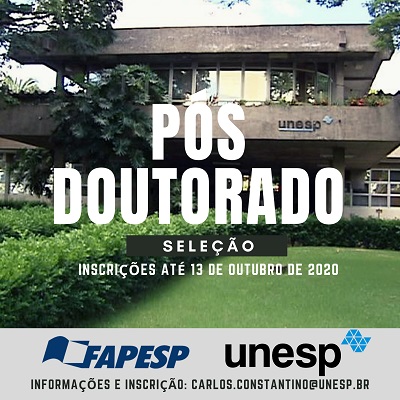Sorry, this entry is only available in Brazilian Portuguese.
Category: Opportunities
(Português) Pós-doutorado em materiais ferroicos para conversão de energia e piezofotônica na UFSCar.
(Português) Processo seletivo para Mestrado em Física na UFRN.
(Português) Seleção para mestrado em materiais na UFABC.
Postdoctoral positions in Biophotonics at CEPOF/ USP.
POSTDOCTORAL POSITIONS (Four positions available) Center for Research in Optics and Photonics – CEPOF University of São Paulo Brazil
CEPOF is looking for excellent and motivated candidates of any nationality with experience in BIOPHOTONICS, in one or more topics of interest, as:
– Advances in Photodynamic Therapy
– Microorganisms control using photonic strategies
– Photobiomodulation
– Photoimunotherapy for targeting cancer and microorganisms
– New photosensitizers for PDT from natural molecules
– Organic synthesis and photocatalyzed reactions
– Digital agriculture (methods and sensors)
– Food safety using photonic techniques
– Quantum biophotonics
– Microscopy and spectroscopy techniques
– Optical instrumentation for medical devices
– Artificial intelligence, Imaging and data analysis
A full list of research projects can be found at http://cepof.ifsc.usp.br
The candidate will develop research in one of the laboratories of CEPOF.
The projects aim to investigate innovative aspects in Biophotonics for designing new optical applications and instrumentation in Life Sciences. We expect to generate new knowledge in the topics of interest.
The candidate must have obtained PhD degree in Physics, Biology, Engineering, Chemistry, Computational Sciences, Biomedical Sciences or related areas, during the past 5 years.
Necessary documents (to be sent by email: cristina@ifsc.usp.br):
– Two recommendation letters
– CV with list of publications and expertise
– One-page letter of interest (the specific topic(s) of interest must be clear)
– Name and contact information of the providers of the recommendation letters.
Application deadline: October 10th, 2020
Candidates selection will be done by the faculties of the CEPOF.
Selected candidates are expected to start the postdoctoral fellow in January – February, 2021. The selected candidate will receive a Post-Doctoral fellowship from the São Paulo Research Foundation (FAPESP) in the amount of R$ 7,373.10 monthly and a research contingency fund, equivalent to 15% of the annual value of the fellowship which should be spent in items directly related to the research activity.
(Português) Processo seletivo para mestrado em Nanociência, Processos e Materiais Avançados na UFSC – Campus Blumenau.
(Português) Cursos de extensão e de especialização EaD em Nanociências.
Postdoctoral Fellowship at UNESP.
 *Opportunity: the Laboratory of Nanostructured Materials for Environmental and Biological Analyses invites applications for a post-doctoral research fellowship funded by São Paulo Research Foundation (FAPESP: https://www.fapesp.br/en). This fellowship is linked to the Thematic Project “Toward a convergence of technologies: from sensing and biosensing to information visualization and machine learning for data analysis in clinical diagnosis” (FAPESP process number: 2018/22214-6).
*Opportunity: the Laboratory of Nanostructured Materials for Environmental and Biological Analyses invites applications for a post-doctoral research fellowship funded by São Paulo Research Foundation (FAPESP: https://www.fapesp.br/en). This fellowship is linked to the Thematic Project “Toward a convergence of technologies: from sensing and biosensing to information visualization and machine learning for data analysis in clinical diagnosis” (FAPESP process number: 2018/22214-6).
*Supervisor: Carlos José Leopoldo Constantino (full professor).
*Institution: Department of Physics, São Paulo State University (UNESP), campus in the city of Presidente Prudente, São Paulo State, Brazil (https://www.international.unesp.br/).
*Fellowship components: it includes a monthly stipend (R$ 7,373.10) and research contingency funds (15 per cent of the annual value of the fellowship for using in activities developed by the Fellowship holder, strictly related to the fellowship research project).
*Duration of the post-doctoral fellowship: up to 48 months (starting: December/01/2020 or as soon as possible; ending: up to February/28/2025).
*More info/fellowship: https://www.fapesp.br/en/postdoc
*Candidate requirements: she or he should have concluded the Ph.D. less than seven years before the beginning of the post-doctoral fellowship. Applicants must have a Ph.D. in physics, chemistry, materials science or related fields. The successful candidate must have excellent communication skills and excel in a highly collaborative research environment. In addition to the timely publication of research results in peer-reviewed journals, the responsibilities of the post-doctoral include drafting progress reports. The successful candidate will conduct research on: Detection of pesticides using surface-enhanced Raman scattering (SERS) spectroscopy. Therefore, this research includes experimental activities using techniques such as:
(i) Synthesis of colloid of metallic nanoparticles applied as “SERS substrate”.
(ii) Characterizations of the “SERS substrates” through microscopy, UV-Vis extinction spectroscopy, zeta potential, and dynamic light scattering (DLS).
(iii) Micro-Raman and surface-enhanced Raman scattering (SERS) spectroscopies.
(iv) Computational methods for data analysis.
*Deadline for application: October/13/2020.
*Application: interested individuals should send to carlos.constantino@unesp.br the following documents:
(i) CV with the list of publications.
(ii) Two letters of recommendation.
(iii) Work plan: 4-pages maximum with title, justification, objectives, and methodology.
Available facilities (basic):
https://www.fct.unesp.br/#!/departamentos/fisica-quimica-e-biologia/laboratorios/
